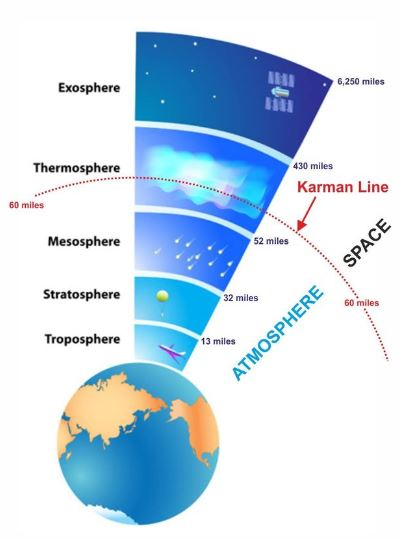Science & Technology
New Shephard: Taking Tourists to Space
- 15 Jun 2021
- 6 min read
Why in News
Recently, a company called Blue Origin concluded the online auction for the first seat on New Shephard, a rocket system meant to take tourists to space.
- It takes its first human flight on 20th July, 2021, which marks the 52nd anniversary of Neil Armstrong and Buzz Aldrin’s moon landing.
Key Points
- New Shephard:
- New Shephard has been named after astronaut Alan Shephard – the first American to go to space – and offers flights to space over 100 km above the Earth and accommodation for payloads.
- It is a rocket system that has been designed to take astronauts and research payloads past the Karman line.
- The idea is to provide easier and more cost-effective access to space meant for purposes such as academic research, corporate technology development and entrepreneurial ventures among others.
- It will also allow space tourists to experience microgravity by taking them 100 km above the Earth.
- Microgravity is the condition in which people or objects appear to be weightless. The effects of microgravity can be seen when astronauts and objects float in space.
Karman Line
- The Karman line is the internationally recognized boundary of space.
- The line is named after Theodore von Kármán (1881–1963), a Hungarian American engineer and physicist, who was active primarily in aeronautics and astronautics.
- He was the first person to calculate the altitude at which the atmosphere becomes too thin to support aeronautical flight and arrived at 83.6 km himself.
- The Fédération Aéronautique Internationale (FAI) defines Karman Line as the altitude of 100 kilometres above Earth’s mean sea level.
- FAI is the world governing body for air sports, and also stewards definitions regarding human spaceflight.
- However, other organizations do not use this definition. There is no international law defining the edge of space, and therefore the limit of national airspace.
- Space Tourism
- About:
- Space tourism is about humans travelling into space for recreational purposes. It seeks to give laypeople the ability to go to space for recreational, leisure or business purposes.
- It will make space more accessible to those individuals who are not astronauts and want to go to space for non-scientific purposes.
- Three private companies – Blue Origin, Virgin Galactic and SpaceX are now spearheading the human endeavour to explore space.
- Their progress will decide whether space travel will one day become as accessible as air travel.
- Previous Space Tourists:
- The first space tourist was US millionaire Dennis Tito, who in 2001 paid USD 20 million to hitch a ride on a Russian Soyuz spacecraft to visit the international space station and spent eight days there.
- After Tito, there were only seven other private citizens who travelled to space until 2009 when the Russian space agency wound up the business of selling tickets to private citizens.
- Space Adventures is the only private company to send paying customers to orbital space so far. In 2004, test pilot Mike Melville became the first private astronaut to fly beyond the Karman Line.
- The first space tourist was US millionaire Dennis Tito, who in 2001 paid USD 20 million to hitch a ride on a Russian Soyuz spacecraft to visit the international space station and spent eight days there.
- Significance:
- Huge Market:
- There is an estimated market of 2.4 million people for such flights.
- Base for Testing:
- It can provide a base for testing supersonic travel between different destinations on earth, significantly compressing travel time. Besides, it heralds the entry of the private sector into this arena.
- Huge Market:
- Concerns:
- Climate Change: Soot or black carbon that results from rocket emissions accumulated in the stratosphere (approximately 5 to 31 miles above the Earth) cannot be washed away by rain or winds, as it is in the lower atmosphere. As a result, black carbon may linger in the stratosphere for years, causing exponentially more climate change.
- Health: It can cause health concerns as passengers could also face motion sickness and disorientation, which can affect vision, cognition, balance and motor control.
- About:
Way Forward
- There are crucial safety, comfort and health factors to consider. Training, medical screenings and liability waivers will need to be examined before tourists head to space.
- Space tourism will be a small subsector of the industry, but it will bolster the entire New Space industry.
- Once space tourism does become mainstream, it will also positively impact many socioeconomic factors on Earth: creating jobs, educating citizens about space and fostering a new solar-based energy infrastructure.





